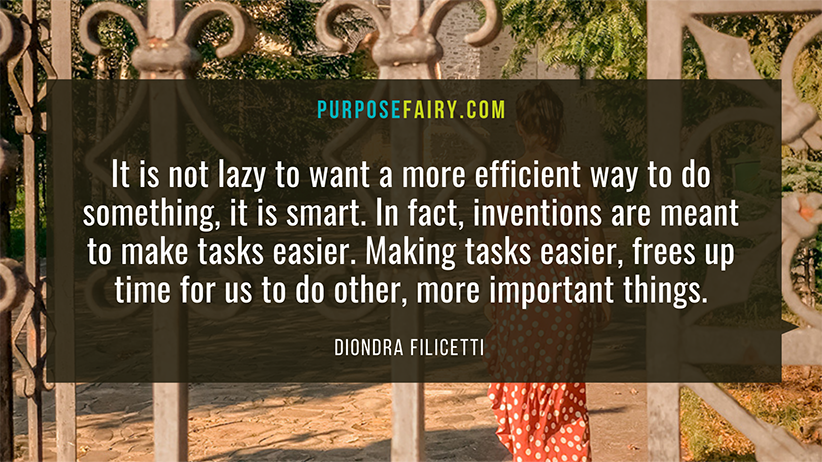
I have always had a certain aversion for particular tasks growing up. One that sticks out most in my mind was when I had to do the dishes.
This was because growing up we didn’t have a dishwasher. There was a constant conflict between my parents and myself, arguing over when I would do the dishes.
Even now I can hear my mother saying:
“Don’t you leave that plate in the sink without washing it.”
I would always respond with:
“Mom, I’ll wash all my dishes later… at the end of the day, when I’ve got a larger pile.”
She would then say:
“Why are you so LAZY Diondra, it’s one plate, it’s easier to do it now.”
Why I Didn’t Want to Do the Dishes
Getting called lazy irritated me so much because I truly believed that it was more efficient and made more sense to do the dishes once per day, when you have accumulated a pile.
Outside of the household chores, I thought I was a hardworking and self-motivated person. So there was something about being called lazy that didn’t sit right with me.
Lately, I have been thinking more about the relationship of my aversion to particular tasks with the guilt of being called lazy. I realized that what I hated most was not that I had to do the dishes but that I knew that there was a better way to do it.
There was cutting edge technology available to do the dishes for you!
Yet, my mother refused to even consider purchasing a dishwasher because she didn’t see anything wrong with washing dishes by hand. It frustrated me that she didn’t see that a dishwasher would save so much time, eliminate our constant arguing and would even prevent the nail damage she constantly complained about.
There was a better way, yet I was stuck doing a repetitive task that I really resented.
So I realized that my problem wasn’t with washing the dishes, my problem was that it was inefficient and somewhat unnecessary, because it was a problem that already had a solution.

I started to see this same cycle of task aversion and frustration at work, with particular tasks I couldn’t stand doing. I proposed a variety of solutions to restructure particular records in a digital format that would be searchable and accessible and much more efficient for everyone.
I was met with the same reaction, a rejection of the idea and an insinuation that I should just continue to do it the way it has always been done, because there was “nothing wrong” with the current system.
So did that make me lazy for wanting a better way to get tasks done?
It is not lazy to want a more efficient way to do something, it is smart. In fact, inventions are meant to make tasks easier. Making tasks easier, frees up time for us to do other, more important things.

Imagine if we all still had to harvest our own food, we wouldn’t have time to do anything else!
For anyone in a work environment, loathing inefficient tasks because you know there is a better way, don’t drink the punch and believe that you are lazy simply because you won’t comply and buy into inefficiency. Instead, question whether you are in a complacent environment:
Laziness, Inefficiency and Complacency in the Work Environment
1. Inefficiencies.
A complacent work environment if often riddled with inefficient methods of doing things, because nobody ever bothered to improve these methods, or perhaps they don’t care to make improvements. They are just fine with the status quo.
2. Lack of Initiative.
Complacent work environments contain people who lack initiative. People are unwilling to take responsibility and take ownership of projects or tasks that are outside of their job description. You’ll often hear the phrase, “Well that’s not my job.”
3. Passive Aggression / Insults.
When complacent people disagree with the ideas/initiatives of proactive people, they will often want to discourage the proactive people by making insults or responding with passive aggression. Remember, “Stop being so lazy Diondra?” And have you ever heard, “Why fix what’s not broken?”
3. No Self-Investment or Investment in the Business.
Complacency in the workplace often stems from complacency or a lack of leadership within management. This often manifests itself as an unwillingness of managers to invest in the employees or in the business.
Improvement projects might be declined, funding for employee education might not exist, and there might not be a tolerance for people who step out of line and try to do things a different way.
Suffice to say, management would like to stick to business as is, because it has been working fine for them.
If you find yourself in a complacent work environment, you really have two options. The first is despite all of the resistance you’re going to face, try to demonstrate the value that a dishwasher could bring to the operation, i.e. try to make improvements. The second option is to find a workplace where your ideas will be heard and valued.
Whatever path you choose, don’t allow yourself to become complacent and accepting of the inefficient tasks assigned to you. If you are not in an environment that will listen to your suggestions and they instead call you lazy, entitled or difficult, understand that you might just be surrounded by complacency.

Keep in mind that if it weren’t for so called “lazy” people, in search of improvements and efficiencies, a dishwasher and the many inventions we have in our lives today probably wouldn’t exist.
Looking for more?
Check out Diondra’s YouTube video on Burn Out
Comments
Diondra Filicetti
Purpose Mentor, Owner at Driven By… Co. Diondra Filicetti is a Purpose Mentor tirelessly deconstructing motivation to get to the core of what drives people in order to understand fulfillment. For her, continuous improvement is a way of life, whether in the workplace, in society or at home. Self-improvement begins with understanding your purpose, your desired future state and constantly learning from mistakes and making changes. It is her purpose to help others to grow and to develop on their individual paths to fulfillment. Connect with Diondra online LinkedIn, YouTube, Instagram
read more